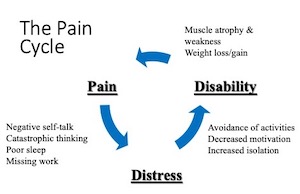Chronic Pain Management
Cognitive-behavioral therapy (CBT) is an effective treatment approach for managing various chronic pain conditions, including rheumatoid arthritis, osteoarthritis, chronic back pain, and tension/migraine headache. CBT engages patients in an active coping process aimed at changing maladaptive thoughts and behaviors that can serve to maintain and exacerbate the experience of chronic pain.
Understanding the Cycle of Pain:

Reviewing the Cycle of Pain serves as a starting point for talking about how pain, distress, and disability can interact with one another and impact the experience of pain. For example, when pain persists over an extended period of time some people may start to have negative beliefs about their pain such as, “This pain is never going to get better”, or develop negative views of themselves such as, “I’m worthless to my family because I can’t work” or “I was going to be a nurse/carpenter/firefighter but now that is gone.” When this pattern of thinking continues, people may start to feel down and depressed. As pain and depressive symptoms continue, people may withdraw or avoid doing everyday activities for fear of further injury or increased pain. They may also withdraw from activities they once enjoyed because they are tired of answering questions like “you look fine – why aren’t you working?” Due to pulling back and being less active a person may experience muscle loss or weakness, gain weight, or experience other changes in their body. When discussing this cycle with a person who has #chronicpain we stop along the way and talk about their experience. “This has been me for the past ___ years” I often hear. Understanding the cycle of pain does not mean that pain is “in your head” or is somehow “psychological.” What it does is open up the possibility that by learning ways to address pain-related negative thinking and finding ways to keep as active as possible a person can change how pain impacts their life.
What is Cognitive Behavioral Therapy for Pain?
Cognitive behavioral therapy (CBT) is now considered the “gold standard” psychological treatment for chronic pain, and has substantial empirical support. Cognitive-behavioral treatment approaches focus on changing certain target behaviors that appear to be problematic and teaching adaptive ways of coping. CBT for chronic pain is widely used as a stand-alone treatment or as part of multidisciplinary pain treatment programs. Importantly, decades of research have now contributed to our understanding of the various factors that should be considered when providing CBT to patients with chronic pain, and on ways in which therapists can tailor CBT to the specific needs of each patient in order to maximize treatment efficacy. The application of the cognitive-behavioral model to the management of chronic pain is based on the understanding that pain is a complex experience that is not only influenced by the presence of underlying pathology, but also by an individual’s thoughts, emotions and behaviors. Thus, we have now come a long way from old simplistic models that considered pain as either “physical” or “psychological”, and as a result, patients with chronic pain now have increased hope for improved daily functioning and quality of life.
Our Treatment Approach:
Individuals who are interested in learning more about treatment should contact the Behavioral Medicine Program at CARD at (617)-353-9610. Our front desk staff will connect you with the director of the program who will answer all of your questions.
Each patient will participate in a comprehensive pain assessment in order to gain a greater understanding of the factors that have contributed to their condition. Based on this assessment, we will develop a individualized treatment plan that will be reviewed with the patient including a list of pain management skills and overall treatment goals identified by the patient. Our treatment approach is based on the evidence-based CBT treatment program developed by Dr. John Otis entitled Managing Chronic Pain (Oxford University Press: Treatments that Work Series).
CBT for chronic pain is short-term and goal-oriented therapy that is designed to give our patients skills that they can use. Patients do not need to stop taking their current pain medications to participate; however, people who participate in CBT for pain often report that they are able to reduce their reliance on pain medication.